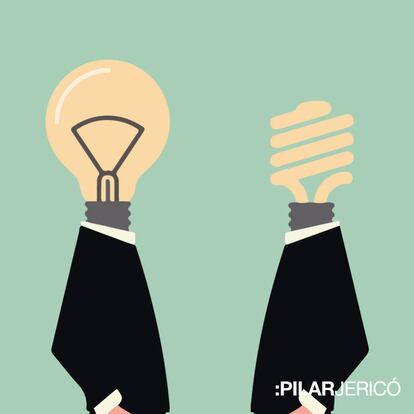When young people start to mentor their own bosses
As a veteran hotelier found when he joined Airbnb, a process of constant learning allows us to reinvent ourselves and be happier in our lives and career

When he was 52 years old, Chip Conley joined one of the sexiest companies on the worldwide web: Airbnb, a site that provides an alternative to hotels, and specializes in finding accommodation at reasonable prices. Conley had a great professional track record: 24 years before he had created what would become the second-biggest boutique brand of hotels around the world. But of course, in those days you didn’t make a reservation just by clicking a button on some website. As he explains in an article published by the Harvard Business Review, when he joined Airbnb he was essentially an intern in new technologies and digital methodologies. He found great success as a strategy consultant at Airbnb – and the key to doing so was his capacity to learn.
In a world that is rapidly changing, we must be good learners and receptive to anything new in our lives
In a world that is rapidly changing, we must be good learners, be receptive to anything new in our lives and pay attention to what is going on in the market. Knowledge is not just found in people who already have years of experience, but also in those who can contribute a different perspective – as young people can. Because of this, it should come as no surprise that a lot of companies are creating reverse mentoring programs, where younger generations teach older ones how to use technology, along with customs or habits of their own day and age.
Traditionally, a mentor is seen as a person with a lot of experience, who passes on what they have learned in life to a youngster. However, in a world where children are being born with a laptop and a smartphone in their hands, the roles are reversed, and young people have a huge advantage in technology skills compared to those from previous generations. Because of this, many decades ago Nokia launched one of the first reverse mentoring projects, so that young people could enlighten managers with the trends of the time. Many North American companies have followed Nokia’s lead and little by little these techniques have started to take root in Spain as well. But there is one challenge in Spain, and it is not related to the abilities or otherwise of young people, but rather from the attitude of the mentee, given that older people in this country are not always willing to accept advice from youngsters. Unfortunately, this prejudice plays against us, because when you ask the same questions of someone with a fresh perspective, opportunities start to appear.
This is precisely what happened in a well-known Madrid business school. One of the professors made his students mentors, so that they could help find a new focus for the recruitment of students. “All you do is give talks on the excellence of the program,” the youngsters said, “but we get on social media and search for information, we ask alumni, but the school does little more than just put out advertising.” From then on, the student mentors themselves started proposing ways to improve the recruitment strategy (with the resistance and disapproval of the admissions department, who had “always” done things the same way).
Reverse mentoring is a positive eye-opener to new learning opportunities for both parties
Reverse mentoring is a positive eye-opener to new learning opportunities for both parties: the older ones can tap into knowledge of the technological sphere that at times seems to escape us, and the younger ones can equip themselves with emotional intelligence and maturity, things that are obtained with age. But if the company doesn’t provide this method for its employees, what can be done? The solution is simple: we need to find ourselves a mentor, someone who can help us improve these aspects of our lives.
The thing that is going to let us reinvent ourselves and finally be happy is continuous learning. We need to open ourselves up to the world and its possibilities, to look at life through different eyes and question everything. We need to be humble enough to accept that our current knowledge may become obsolete and we need to have enough curiosity to be able to lurk in terrain that has the potential to be uncomfortable. This doesn’t mean we have to discard what we know. On the contrary, what we need to do is value what we know now, and couple it with this new information that the other person contributes. As Chip Conley said, “we workers ‘of a certain age’ are less like a carton of milk and more like a bottle of fine wine.” So with this attitude, let’s look for mentors who can enrich both our professional and personal lives.
English version by Laura Rodríguez.
Tu suscripción se está usando en otro dispositivo
¿Quieres añadir otro usuario a tu suscripción?
Si continúas leyendo en este dispositivo, no se podrá leer en el otro.
FlechaTu suscripción se está usando en otro dispositivo y solo puedes acceder a EL PAÍS desde un dispositivo a la vez.
Si quieres compartir tu cuenta, cambia tu suscripción a la modalidad Premium, así podrás añadir otro usuario. Cada uno accederá con su propia cuenta de email, lo que os permitirá personalizar vuestra experiencia en EL PAÍS.
¿Tienes una suscripción de empresa? Accede aquí para contratar más cuentas.
En el caso de no saber quién está usando tu cuenta, te recomendamos cambiar tu contraseña aquí.
Si decides continuar compartiendo tu cuenta, este mensaje se mostrará en tu dispositivo y en el de la otra persona que está usando tu cuenta de forma indefinida, afectando a tu experiencia de lectura. Puedes consultar aquí los términos y condiciones de la suscripción digital.








































